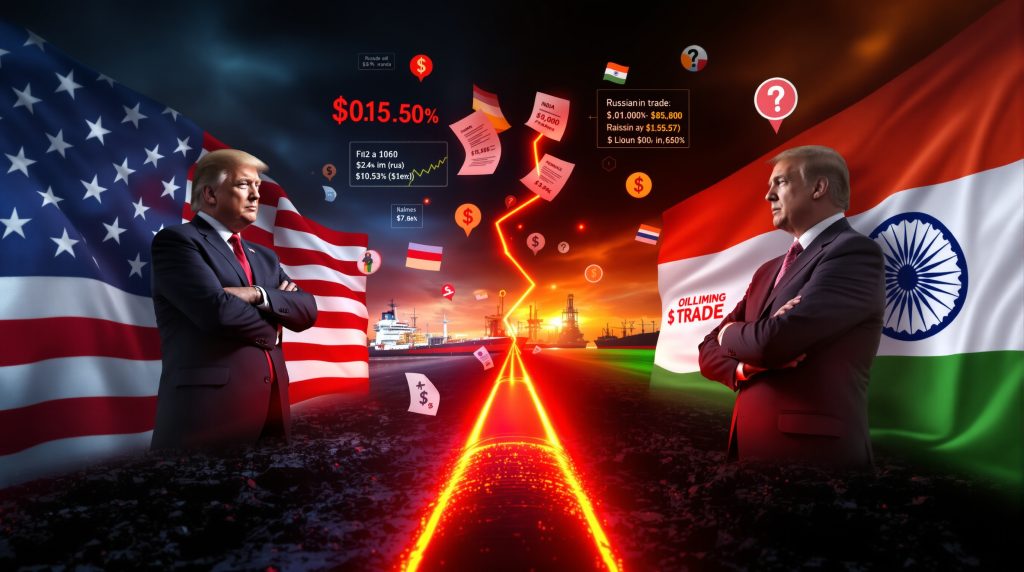US Presses India: Cut Russian Oil Imports or Watch Trade Deal Slip Away
The United States has intensified its diplomatic pressure on India, linking progress on a comprehensive trade deal to New Delhi's willingness to reduce its Russian oil imports. This development comes as bilateral trade negotiations enter a critical phase, with Washington explicitly connecting trade concessions to India's energy purchasing decisions. The U.S. tariff impact could be significant if both nations fail to reach an agreement.
American officials have reportedly informed their Indian counterparts that meaningful progress on reducing tariffs and finalizing a trade agreement depends substantially on India curtailing its purchases of Russian crude oil. This stance reflects Washington's broader strategy of isolating Russia economically following geopolitical tensions that have reshaped global energy markets.
The Energy Relationship Triangle
India has substantially increased its Russian oil imports since 2022, taking advantage of discounted prices that have helped the country manage its energy costs. Russian suppliers have offered significant price advantages compared to other international options, making these imports economically attractive for India's growing energy needs.
The OPEC production impact has further complicated global oil supply dynamics, pushing India toward Russian alternatives. According to recent data, India's imports of Russian crude have reached unprecedented levels, accounting for approximately 40% of its total oil purchases in recent months.
American officials have emphasized that while they understand India's economic considerations, the continued high volume of Russian oil purchases undermines international efforts to limit Moscow's revenue streams. Furthermore, U.S. representatives have suggested that substantial reductions in these imports could lead to more favorable terms in ongoing trade negotiations.
Trade Negotiations at a Crossroads
The current trade discussions between the United States and India cover a wide range of sectors and have been ongoing for several years. Both countries seek improved market access and reduced tariffs on goods ranging from agricultural products to technology and medical devices. However, progress has been intermittent, with various sticking points emerging throughout the process.
Recent developments suggest that energy policy has now become a central issue in these negotiations. U.S. officials have indicated that India's purchasing decisions regarding Russian oil will be a "key factor" in determining the pace and outcome of trade talks.
Indian officials have responded cautiously to this pressure, maintaining that energy security remains a top priority for the country. They argue that oil price movements significantly impact India's economy, and purchasing decisions must prioritize affordability and reliability of supply.
Economic Implications for Both Nations
For India, the stakes in these negotiations are substantial. Access to the American market represents significant economic opportunities, particularly for its growing technology and manufacturing sectors. Reduced tariffs on investments could stimulate greater cross-border business activity and potentially create jobs in both economies.
However, energy security concerns remain paramount for Indian policymakers. The country imports more than 80% of its oil requirements, making affordability a critical factor in its purchasing decisions. Russian discounts have reportedly saved India billions of dollars annually since 2022.
For the United States, the diplomatic calculus involves balancing economic interests with broader geopolitical objectives. While expanding trade with India aligns with American economic goals, Washington also seeks to maintain pressure on Russia through various means, including trade war effects and energy sanctions.
According to a Reuters report, Commerce Secretary Gina Raimondo and U.S. Trade Representative Katherine Tai have communicated to their Indian counterparts that "meaningful progress on reducing tariffs and finalizing a trade deal hinges substantially on India curtailing its purchases of Russian crude oil."
Indian Refiners' Response
Some evidence suggests that Indian state-owned refiners have already begun adjusting their purchasing patterns in response to this pressure. Industry sources indicate that companies like Indian Oil Corp, Bharat Petroleum Corp, and Hindustan Petroleum have reduced their Russian oil intake in recent weeks.
Private refiners, however, continue to maintain significant Russian oil imports. Reliance Industries and Nayara Energy, which together account for approximately 40% of India's refining capacity, have shown less immediate response to American pressure.
Energy analysts from Oil Price suggest that India's position remains strategically complex, balancing economic pragmatism with diplomatic considerations. The discounted Russian crude has provided substantial benefits to Indian consumers and businesses during a period of high global inflation.
The Global Context
This situation unfolds against a backdrop of shifting global energy dynamics. Other major economies, particularly in Europe, have substantially reduced their Russian energy imports following geopolitical tensions. This reduction created market opportunities that India and China have largely filled.
American officials have acknowledged India's energy security concerns but emphasize that diversification away from Russian sources would align with long-term strategic interests for both nations. They suggest that a gradual transition could accommodate India's economic needs while addressing U.S. geopolitical concerns.
Looking Forward: Potential Outcomes
Several potential scenarios could emerge from the current impasse:
- India might agree to gradual reductions in Russian oil imports in exchange for specific trade concessions
- Negotiations could stall if India prioritizes energy affordability over trade benefits
- A compromise position might emerge, involving partial reductions and incremental trade progress
- Both sides could seek alternative arrangements that address core concerns without requiring dramatic policy shifts
Economic analysts suggest that finding a middle path would benefit both nations. The U.S.-India relationship extends beyond trade and energy to include security cooperation, technology partnerships, and shared democratic values.
For now, the message from Washington remains clear: India's Russian oil purchases and progress on a comprehensive trade deal are inextricably linked. How New Delhi responds to this pressure will significantly influence not only bilateral economic relations but also broader geopolitical alignments in the Indo-Pacific region.
Looking for Real-Time Mining Investment Opportunities?
Don't miss significant market movements driven by geopolitical shifts and commodity price changes—visit Discovery Alert's discoveries page to see how their proprietary Discovery IQ model helps investors identify actionable opportunities on the ASX before the broader market reacts.




